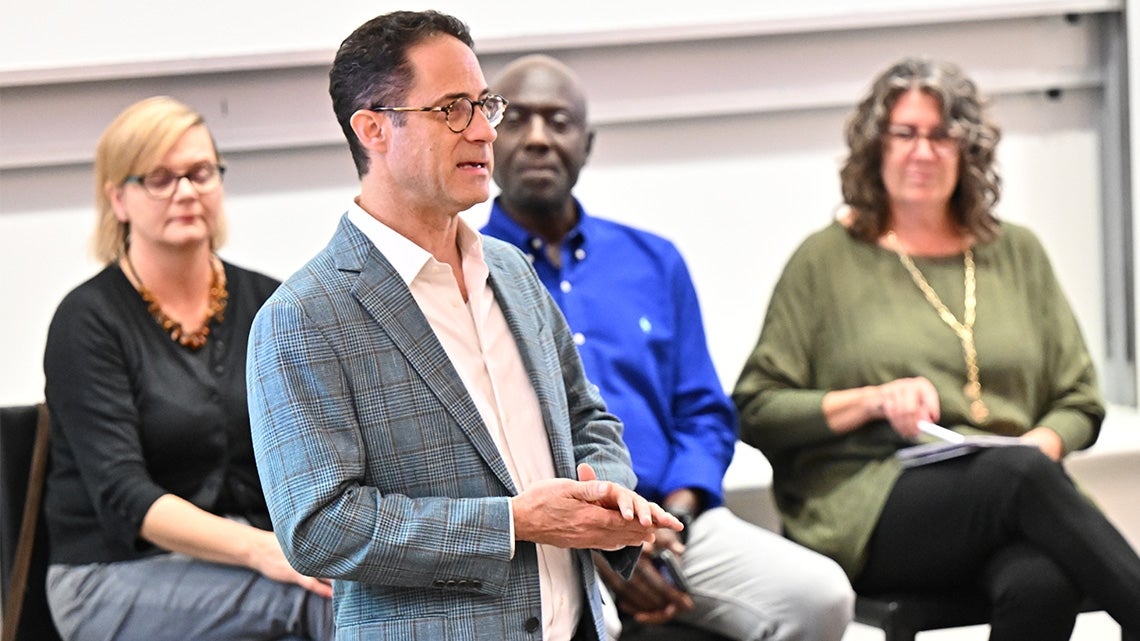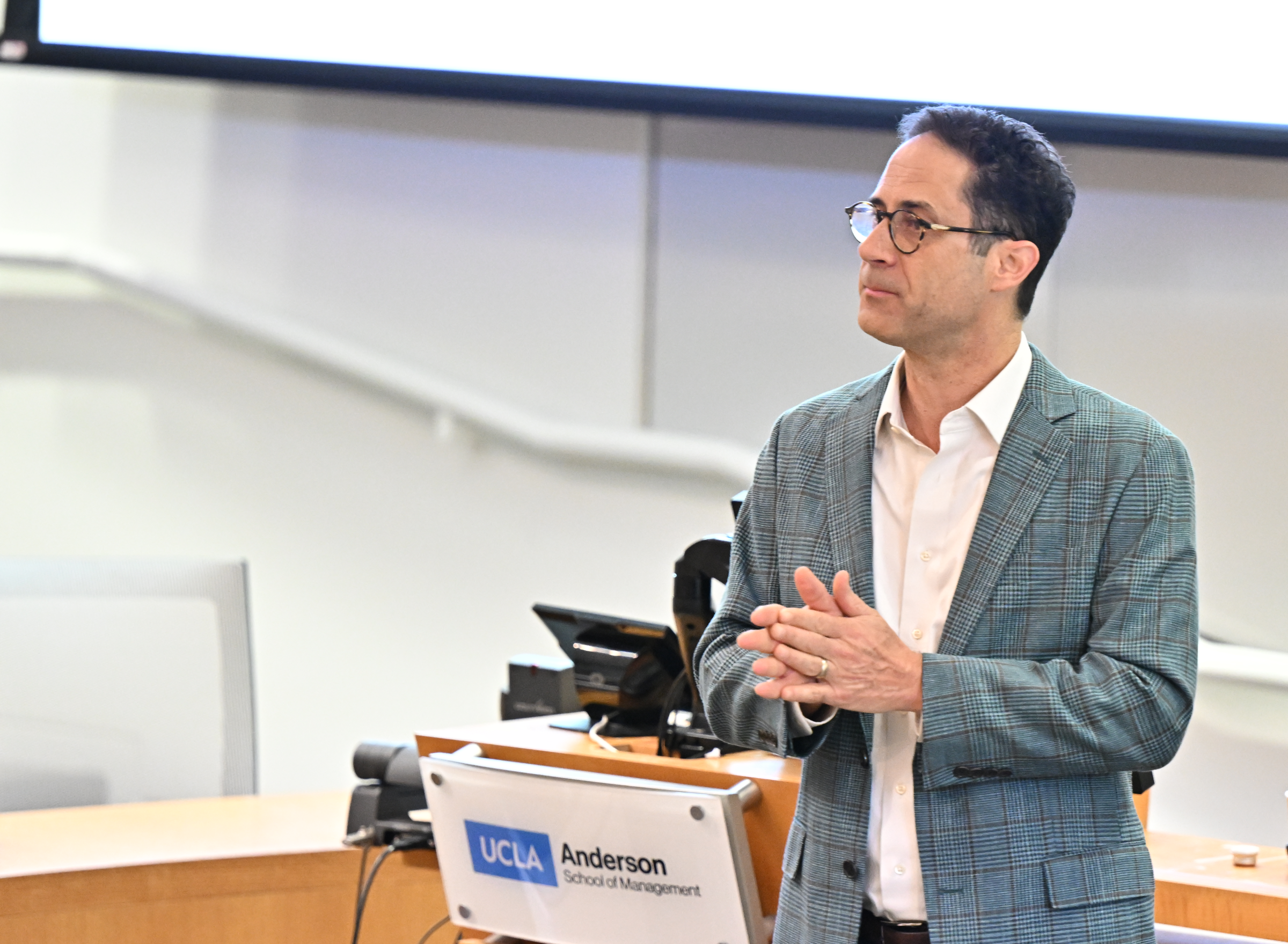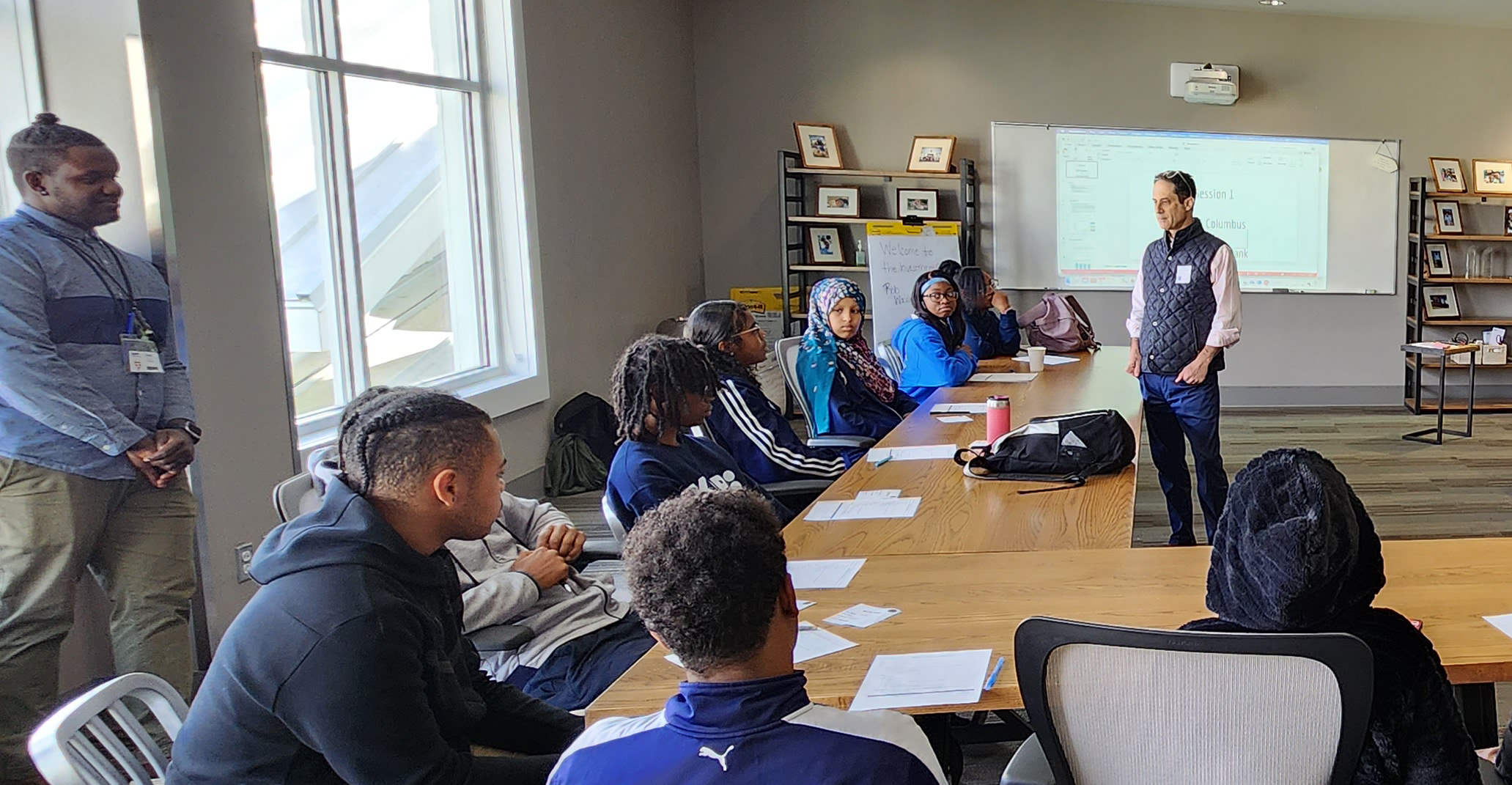UCLA Anderson Alumnus Envisions Community for a Living
UCLA Anderson Alumnus Envisions Community for a Living
Community impact capital veteran Rob Wasserman (MBA/J.D. ’98) invests in broader access
OctOBER 13, 2023

- UCLA Anderson alumnus Rob Wasserman is president of Huntington Bank Community Impact Capital, headquartered in Columbus, Ohio
- He manages investments and lending in historically disadvantaged communities, with the goal of broadening the range and diversity of developers, contractors and owners of affordable housing
- Wasserman is founding board member of the UCLA Ziman Center for Real Estate’s Affordable Housing Advisory Council
“Think of ‘housing’ as more than the roof over your head,” says Rob Wasserman (MBA/J.D. ’98). “The constellation of components includes everything from health care centers to schools to recreation activities, and homes and jobs, of course.”
In other words, envision “community.” A place with broad access to technology, employment that enables you to work in the same area where you live, investors who support your local economy, resources that include legal advocacy.
Wasserman is president of Huntington Bank Community Impact Capital, headquartered in Columbus, Ohio, where he began working in early 2021. “What I do is manage investments and lending in communities. We operate on a two-lane highway: One lane is a financial contribution to the bank, and the other lane is a deep and catalytic impact into communities we serve. My division is a primary line in a bank that also has a double bottom line.”
He spent the previous 17 years with U.S. Bank CDC, following much earlier jobs on the commodities trading floor in New York and in KPMG’s electronic commerce division. He earned two graduate degrees at UCLA, where his connections among fellow students and alumni led him to his current field. “I started working at a Low-Income Housing Tax Credit syndicator,” he says. “I learned both the technical side of the LIHTC business, which is financial, and the legal side. Ultimately, I made my way into the business development side and began leading teams focused on investments, underwriting and equity syndications.”
Wasserman has always been an engaged citizen. He earned a humanitarian award in college for his work against the crime of genocide. “Call it an awareness of the broader society,” he says of what he feels as a responsibility to help others. He teaches monthly investment classes at a Columbus high school tailored to helping students from historically disadvantaged communities understand and expand their financial literacy, and he is on the board of KIPP St. Louis, a leading charter school. He’s president of the Housing Incubator, which is dedicated to broadening the range of developers, contractors and owners of affordable housing to include a much larger number of people of color and women.
“People who succeed well have an understanding of the connections within communities.”
Wasserman is the founding board member of the UCLA Ziman Center for Real Estate’s strategic Affordable Housing Advisory Council (AHAC) and, since its formal launch in 2018, has chaired the council, which consists of industry volunteers. He is also a member of the UCLA Real Estate Alumni Group’s (REAG) Endowment Circle and he has mentored Ziman students and graduates who pursue careers in affordable housing development. Leading AHAC, he has made it his mission to leverage UCLA’s global and national influence to make the affordable housing industry attractive to business professionals who understand investment is key. “The lack of asset creation in low-income communities is one of the top initiatives I believe we must tackle,” he wrote in his quarterly letter to AHAC members.

When you look at Wasserman’s track record, it’s hard to believe there was no Ziman Center when he was a graduate student at UCLA. His professional ethos and interests are so completely aligned with the center’s. Ziman was formally founded in 2001. Before that, the school attracted students like Wasserman who saw the potential for MBAs not just to finance communities, but also to get involved with them. Well after his graduation, Wasserman approached center faculty director Stuart Gabriel, Anderson’s Arden Realty Chair, to propose AHAC. He wrote the white paper for the initiative and, since 2015, has led the council’s efforts in advancement and mentorships.
Wasserman took a detour to law school before earning the Anderson MBA that would give him the deep exposure to financial modeling so vital to his work in community development finance. He humbly says that earning a J.D. served in part to remind him “why I wouldn’t be a good lawyer.”
But he sells himself somewhat short: Even if he’s not suited to, say, litigation, he’s an expert in the legal ins and outs of housing tax credits. In 1996, while in law school at UCLA, he co-founded the Journal of Law and Technology, which continues to publish scholarship on hard and soft IP, artificial intelligence, privacy law, antitrust, trade secrets and other topics in tech law. His co-founder was fellow double Bruin Ari Engelberg (MBA/J.D. ’99), one of the three UCLA Anderson students who founded stamps.com, a finalist in the 1998 Knapp Venture Competition.
“The lack of asset creation in low-income communities is one of the top initiatives I believe we must tackle.”
It stands to reason that, finding the Ziman Center receptive to his ideas about affordable housing development, Wasserman would gravitate back into UCLA’s orbit. He was on the planning committee of the Ziman Center’s successful Levine Affordable Housing Development Program and he volunteers as an LAHDP instructor each year. In addition, he facilitated an Anderson Class of 2021 MBA team’s capstone project with AHAC member LDG Development. Based in Louisville, Kentucky, LDG has developed affordable housing across the country but faced resource constraints on expansion into new markets. The Anderson team developed a model for LDG to identify high-potential markets with attractive fundamentals in southern U.S. states and guided the company on assessing them.
“The knowledge that these students gained by being exposed to housing policies and solutions in other states will only benefit California, as they will implement the learned best practices back home,” Wasserman reported in an AHAC letter.
One of Wasserman’s goals for AHAC is to expand mentorship to minority or female developers, including beyond UCLA, through the Housing Incubator and other channels. He points out that among the top 30 affordable housing developers none of the for-profit development companies are majority owned by an African American or Latinx person. “The percentage of ownership is nowhere representative of the tenant base that is served by our affordable housing initiatives or of the population at large. These low figures of leadership representation also apply to the number of female affordable housing development company owners. On the flip side, the nonprofit developer community has done a much better job of promoting a broader range of individuals of different races and genders to leadership positions.”

As Ziman Center executive director Tim Kawahara says, “Rob is an influencer in the affordable housing industry. Through AHAC, he’s inspiring the next generation and making the industry a less rarefied sector for everyone.”
Anderson, Wasserman reflects, showed him how an academic institution values its duty to prepare future leaders and contribute to communities. He is committed to encouraging business-minded graduate students that they can thrive in an industry that stands to benefit so many. “Affordable housing development professionals can be lenders, builders, lawyers, urban planners, architects, economic development agency professionals,” he says. “People who succeed well have an understanding of the connections within communities.”
Ziman’s LAHDP, he adds, “provides a great entrée for people without traditional advantages.” And UCLA, as an international academic institution, “can contribute to the thought leadership and practical development of talent needed to alleviate the housing crisis.”
The Ziman Center was established in partnership with UCLA’s School of Law, and Wasserman says Anderson MBA students interested in developing affordable housing should take advantage of opportunities to take classes there. The industry requires a strong technical understanding of real estate, tax law and accounting.
What else can an MBA do to prepare for a career in affordable housing development?
“Get involved in civic activities,” Wasserman advises. “Get engaged in affordable housing advocacy groups. Learn from them.”